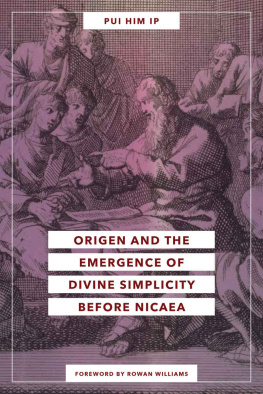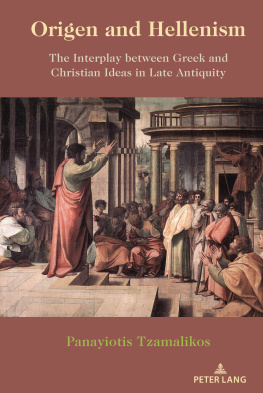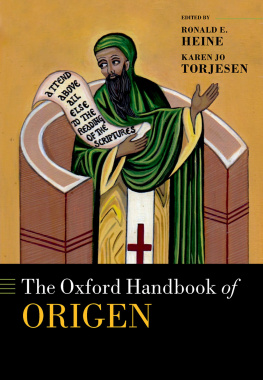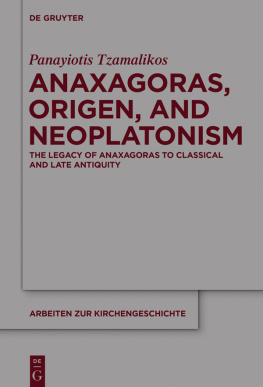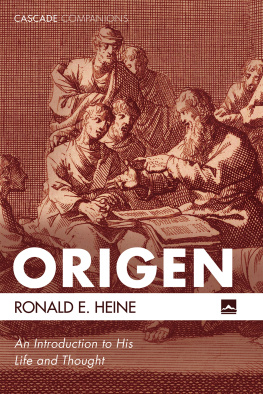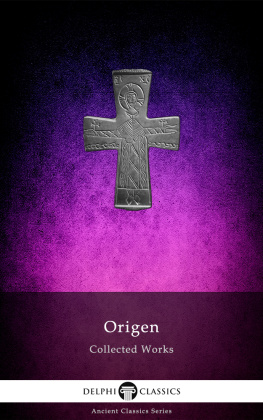Origen - The Complete Works of Origen (8 Books): Cross-Linked to the Bible
Here you can read online Origen - The Complete Works of Origen (8 Books): Cross-Linked to the Bible full text of the book (entire story) in english for free. Download pdf and epub, get meaning, cover and reviews about this ebook. year: 2016, genre: Religion. Description of the work, (preface) as well as reviews are available. Best literature library LitArk.com created for fans of good reading and offers a wide selection of genres:
Romance novel
Science fiction
Adventure
Detective
Science
History
Home and family
Prose
Art
Politics
Computer
Non-fiction
Religion
Business
Children
Humor
Choose a favorite category and find really read worthwhile books. Enjoy immersion in the world of imagination, feel the emotions of the characters or learn something new for yourself, make an fascinating discovery.

- Book:The Complete Works of Origen (8 Books): Cross-Linked to the Bible
- Author:
- Genre:
- Year:2016
- Rating:4 / 5
- Favourites:Add to favourites
- Your mark:
- 80
- 1
- 2
- 3
- 4
- 5
The Complete Works of Origen (8 Books): Cross-Linked to the Bible: summary, description and annotation
We offer to read an annotation, description, summary or preface (depends on what the author of the book "The Complete Works of Origen (8 Books): Cross-Linked to the Bible" wrote himself). If you haven't found the necessary information about the book — write in the comments, we will try to find it.
Origen: author's other books
Who wrote The Complete Works of Origen (8 Books): Cross-Linked to the Bible? Find out the surname, the name of the author of the book and a list of all author's works by series.
The Complete Works of Origen (8 Books): Cross-Linked to the Bible — read online for free the complete book (whole text) full work
Below is the text of the book, divided by pages. System saving the place of the last page read, allows you to conveniently read the book "The Complete Works of Origen (8 Books): Cross-Linked to the Bible" online for free, without having to search again every time where you left off. Put a bookmark, and you can go to the page where you finished reading at any time.
Font size:
Interval:
Bookmark:

This material is available in the public domain.
Published from Toronto, Ontario
Canada
March, 2016
Origen, most modest of writers, hardly ever alludes to himself in his own works; but Eusebius has devoted to him almost the entire sixth book of "Ecclesiastical History". Eusebius was thoroughly acquainted with the life of his hero; he had collected a hundred of his letters; in collaboration with the martyr Pamphilus he had composed the "Apology for Origen"; he dwelt at Caesarea where Origen's library was preserved, and where his memory still lingered; if at times he may be thought somewhat partial, he is undoubtedly well informed. We find some details also in the "Farewell Address" of St. Gregory Thaumaturgus to his master, in the controversies of St. Jerome and Rufinus, in St. Epiphanius (Haeres., LXIV), and in Photius (Biblioth. Cod. 118). Origen at Alexandria (185-232)
Born in 185, Origen was barely seventeen when a bloody persecution of the Church of Alexandrian broke out. His father Leonides, who admired his precocious genius was charmed with his virtuous life, had given him an excellent literary education. When Leonides was cast into prison, Origen would fain have shared his lot, but being unable to carry out his resolution, as his mother had hidden his clothes, he wrote an ardent, enthusiastic letter to his father exhorting him to persevere courageously. When Leonides had won the martyr's crown and his fortune had been confiscated by the imperial authorities, the heroic child laboured to support himself, his mother, and his six younger brothers. This he successfully accomplished by becoming a teacher, selling his manuscripts, and by the generous aid of a certain rich lady, who admired his talents. He assumed, of his own accord, the direction of the catechetical school, on the withdrawal of Clement, and in the following year was confirmed in his office by the patriarch Demetrius (Eusebius, Church History VI.2; St. Jerome, "De viris illust.", liv). Origen's school, which was frequented by pagans, soon became a nursery of neophytes, confessors, and martyrs. Among the latter were Plutarch, Serenus, Heraclides, Heron, another Serenus, and a female catechumen, Herais (Eusebius, Church History VI.4). He accompanied them to the scene of their victories encouraging them by his exhortations. There is nothing more touching than this picture Eusebius has drawn of Origen's youth, so studious, disinterested, austere and pure, ardent and zealous even to indiscretion (VI, iii and vi). Thrust thus at so early an age into the teacher's chair, he recognized the necessity of completing his education. Frequenting the philosophic schools, especially that of Ammonius Saccas, he devoted himself to a study of the philosophers, particularly Plato and the Stoics. In this he was but following the example of his predecessors Pantenus and Clement, and of Heracles, who was to succeed him. Afterwards, when the latter shared his labours in the catechetical school, he learned Hebrew, and communicated frequently with certain Jews who helped him to solve his difficulties.
The course of his work at Alexandria was interrupted by five journeys. About 213, under Pope Zephyrinus and the emperor Caracalla, he desired "to see the very ancient Church of Rome", but he did not remain there long (Eusebius, Church History VI.14). Shortly afterwards he was invited to Arabia by the governor who was desirous of meeting him (VI, xix). It was probably in 215 or 216 when the persecution of Caracalla was raging in Egypt that he visited Palestine, where Theoctistus of Caesarea and Alexander of Jerusalem, invited him to preach though he was still a layman. Towards 218, it would appear, the empress Mammaea, mother of Alexander Severus, brought him to Antioch (VI, xxi). Finally, at a much later period, under Pontian of Rome and Zebinus of Antioch (Eusebius, VI, xxiii), he journeyed into Greece, passing through Caesarea where Theoctistus, Bishop of that city, assisted by Alexander, Bishop of Jerusalem, raised him to the priesthood. Demetrius, although he had given letters of recommendation to Origen, was very much offended by this ordination, which had taken place without his knowledge and, as he thought, in derogation of his rights. If Eusebius (VI, viii) is to be believed, he was envious of the increasing influence of his catechist. So, on his return to Alexandria, Origen soon perceived that his bishop was rather unfriendly towards him. He yielded to the storm and quitted Egypt (231). The details of this affair were recorded by Eusebius in the lost second book of the "Apology for Origen"; according to Photius, who had read the work, two councils were held at Alexandria, one of which pronounced a decree of banishment against Origen while the other deposed him from the priesthood (Biblioth. cod. 118). St. Jerome declares expressly that he was not condemned on a point of doctrine.
Expelled from Alexandria, Origen fixed his abode at Caesarea in Palestine (232), with his protector and friend Theoctistus, founded a new school there, and resumed his "Commentary on St. John" at the point where it had been interrupted. He was soon surrounded by pupils. The most distinguished of these, without doubt, was St. Gregory Thaumaturgus who, with his brother Apollodorus, attended Origen's lectures for five years and delivered on leaving him a celebrated "Farewell Address". During the persecution of Maximinus (235-37) Origen visited his friend, St. Firmilian, Bishop of Caesarea in Cappadocia, who made him remain for a long period. On this occasion he was hospitably entertained by a Christian lady of Caesarea, named Juliana, who had inherited the writing of Symmachus, the translator of the Old Testament (Palladius, "Hist. Laus.", 147). The years following were devoted almost uninterruptedly to the composition of the "Commentaries". Mention is made only of a few excursions to Holy Places, a journey to Athens (Eusebius, VI, xxxii), and two voyages to Arabia, one of which was undertaken for the conversion of Beryllus, a Patripassian (Eusebius, VI, xxxiii; St. Jerome, Illustrious Men 60), the other to refute certain heretics who denied the Resurrection (Eusebius, Church History VI.37). Age did not diminish his activities. He was over sixty when he wrote his "Contra Celsum" and his "Commentary on St. Matthew". The persecution of Decius (250) prevented him from continuing these works. Origen was imprisoned and barbarously tortured, but his courage was unshaken and from his prison he wrote letters breathing the spirit of the martyrs (Eusebius, Church History VI.39). He was still alive on the death of Decius (251), but only lingering on, and he died, probably, from the results of the sufferings endured during the persecution (253 or 254), at the age of sixty-nine (Eusebius, Church History VII.1). His last days were spent at Tyr, though his reason for retiring thither is unknown. He was buried with honour as a confessor of the Faith. For a long time his sepulchre, behind the high-altar of the cathedral of Tyr, was visited by pilgrims. Today, as nothing remains of this cathedral except a mass of ruins, the exact location of his tomb is unknown.
Very few authors were as fertile as Origen. St. Epiphanius estimates at six thousand the number of his writings, counting separately, without doubt, the different books of a single work, his homilies, letters, and his smallest treatises (Haeres., LXIV, lxiii). This figure, repeated by many ecclesiastical writers, seems greatly exaggerated. St. Jerome assures us that the list of Origen's writings drawn up by St. Pamphilus did not contain even two thousand titles (Contra Rufin., II, xxii; III, xxiii); but this list was evidently incomplete. Eusebius (Church History VI.32) had inserted it in his biography of St. Pamphilus and St. Jerome inserted it in a letter to Paula.
Font size:
Interval:
Bookmark:
Similar books «The Complete Works of Origen (8 Books): Cross-Linked to the Bible»
Look at similar books to The Complete Works of Origen (8 Books): Cross-Linked to the Bible. We have selected literature similar in name and meaning in the hope of providing readers with more options to find new, interesting, not yet read works.
Discussion, reviews of the book The Complete Works of Origen (8 Books): Cross-Linked to the Bible and just readers' own opinions. Leave your comments, write what you think about the work, its meaning or the main characters. Specify what exactly you liked and what you didn't like, and why you think so.

